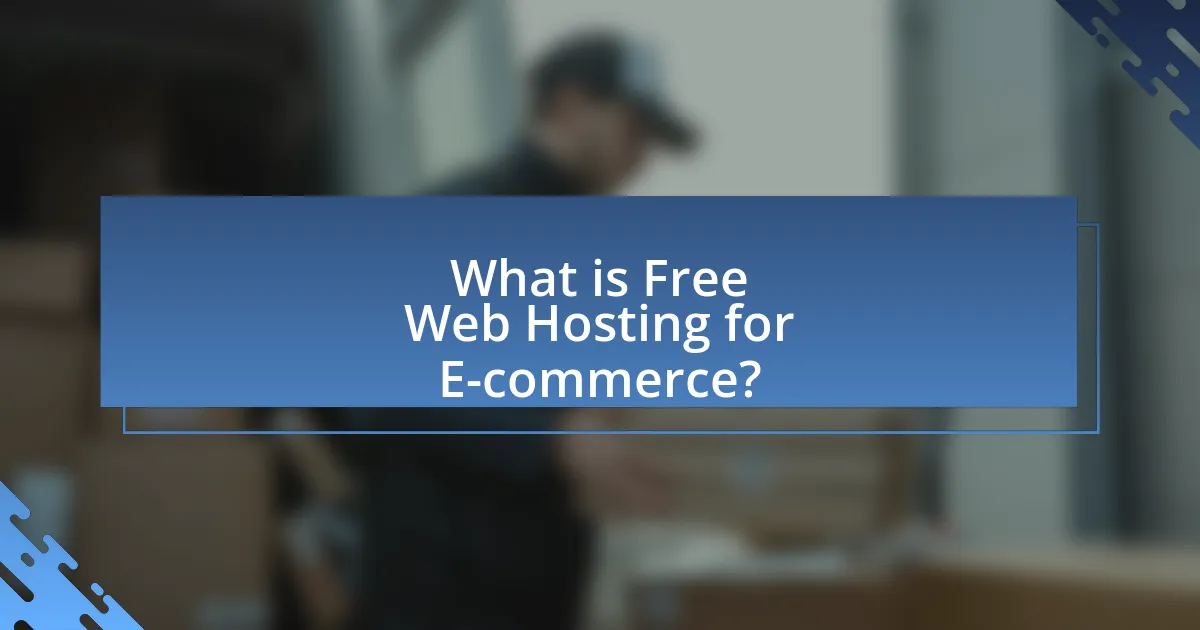Free web hosting for e-commerce provides businesses with a cost-effective solution to establish their online presence without upfront expenses. This article explores the differences between free and paid hosting options, highlighting the limitations of free services, such as restricted storage, bandwidth, and security vulnerabilities. It also discusses how small businesses can leverage free hosting to minimize costs while outlining essential features for e-commerce, compatible platforms, and strategies to enhance site performance. Additionally, the article addresses potential risks associated with free hosting and offers best practices for managing an e-commerce site effectively.

What is Free Web Hosting for E-commerce?
Free web hosting for e-commerce refers to online services that allow businesses to host their e-commerce websites without incurring costs. These platforms typically provide essential features such as website builders, limited storage, and bandwidth, enabling users to set up online stores without upfront investment. According to a report by Statista, as of 2023, a significant percentage of small businesses utilize free hosting options to minimize operational costs while establishing their online presence.
How does Free Web Hosting differ from paid options?
Free web hosting differs from paid options primarily in terms of features, reliability, and support. Free web hosting typically offers limited storage, bandwidth, and functionality, often including advertisements on the hosted site, while paid hosting provides more resources, enhanced performance, and customer support. For instance, a study by HostingAdvice in 2021 indicated that paid hosting services generally offer 99.9% uptime guarantees, whereas free hosting services may have significantly lower uptime, impacting e-commerce operations. Additionally, paid options often include advanced security features and the ability to use custom domain names, which are crucial for professional e-commerce sites.
What are the limitations of Free Web Hosting for E-commerce?
Free web hosting for e-commerce has several limitations that can hinder business operations. Firstly, free web hosting often lacks essential features such as custom domain names, which can affect brand credibility and recognition. Additionally, these services typically impose bandwidth and storage limitations, restricting the amount of traffic and data that can be handled, which can lead to slow loading times and potential downtime during peak traffic periods. Security is another significant concern, as free hosting providers may not offer robust security measures, making e-commerce sites vulnerable to data breaches and cyberattacks. Furthermore, free web hosting often includes advertisements, which can detract from the user experience and diminish the professional appearance of an online store. Lastly, customer support is usually minimal or non-existent, leaving e-commerce businesses without timely assistance during critical issues. These limitations collectively make free web hosting a less viable option for serious e-commerce ventures.
How can Free Web Hosting support small businesses?
Free web hosting can support small businesses by providing them with a cost-effective platform to establish an online presence. This allows small businesses to create websites without incurring hosting fees, which is crucial for startups with limited budgets. According to a survey by Clutch, 30% of small businesses reported that their primary challenge is managing costs, and free web hosting alleviates this burden. Additionally, free web hosting services often include essential features such as website builders and templates, enabling small businesses to design and launch their sites quickly and efficiently. This accessibility can lead to increased visibility and customer engagement, ultimately driving sales and growth.
What are the key features of Free Web Hosting suitable for E-commerce?
Key features of free web hosting suitable for e-commerce include sufficient bandwidth, reliable uptime, e-commerce support, and security measures. Sufficient bandwidth ensures that the website can handle traffic without slowdowns, which is crucial for maintaining customer satisfaction. Reliable uptime, ideally above 99.9%, guarantees that the online store remains accessible to customers at all times, directly impacting sales. E-commerce support features, such as shopping cart integration and payment gateway compatibility, are essential for facilitating transactions. Additionally, security measures like SSL certificates and data encryption protect sensitive customer information, fostering trust and compliance with regulations. These features collectively enhance the functionality and reliability of free web hosting for e-commerce purposes.
Which e-commerce platforms are compatible with Free Web Hosting?
Several e-commerce platforms are compatible with free web hosting, including WooCommerce, PrestaShop, and OpenCart. WooCommerce, a plugin for WordPress, allows users to set up an online store on free WordPress hosting services. PrestaShop and OpenCart are standalone platforms that can also be installed on various free hosting providers. These platforms typically offer essential e-commerce functionalities, making them suitable for small businesses or startups looking to minimize costs while establishing an online presence.
How does bandwidth and storage impact E-commerce performance?
Bandwidth and storage significantly impact E-commerce performance by influencing website speed, user experience, and the ability to handle traffic. High bandwidth allows for faster data transfer, which reduces loading times; studies show that a one-second delay in page load time can lead to a 7% reduction in conversions. Adequate storage is essential for hosting product images, videos, and customer data, directly affecting the website’s functionality and scalability. For instance, E-commerce platforms with insufficient storage may experience slow performance during peak traffic times, leading to potential revenue loss. Therefore, optimizing both bandwidth and storage is crucial for maintaining an efficient and responsive E-commerce site.
What are the potential risks of using Free Web Hosting for E-commerce?
Using free web hosting for e-commerce poses several potential risks, including limited security, lack of customer support, and unreliable uptime. Limited security can expose sensitive customer data to breaches, as free hosting services often lack robust security measures like SSL certificates and regular updates. The absence of dedicated customer support can lead to prolonged downtime or unresolved technical issues, negatively impacting sales and customer trust. Additionally, free hosting services frequently experience unreliable uptime, which can result in lost revenue during outages and a poor user experience. These factors collectively jeopardize the integrity and success of an e-commerce business.
How can security issues affect an E-commerce site on Free Web Hosting?
Security issues can severely compromise an E-commerce site on free web hosting by exposing sensitive customer data and leading to financial losses. Free web hosting often lacks robust security measures, making sites vulnerable to hacking, data breaches, and malware attacks. For instance, a study by the Ponemon Institute found that the average cost of a data breach is $3.86 million, highlighting the financial risks associated with inadequate security. Additionally, compromised sites can suffer from reputational damage, resulting in lost customer trust and decreased sales. Therefore, the lack of security in free web hosting can have dire consequences for E-commerce operations.
What are the implications of limited customer support?
Limited customer support can lead to decreased customer satisfaction and increased churn rates. When customers encounter issues and cannot receive timely assistance, they may feel frustrated and undervalued, which can result in negative reviews and a damaged brand reputation. Research indicates that 78% of consumers have abandoned a transaction due to poor customer service, highlighting the critical role support plays in retaining customers. Furthermore, limited support can hinder the resolution of technical problems, leading to prolonged downtime for e-commerce platforms, which directly impacts sales and revenue.
How can businesses effectively utilize Free Web Hosting for E-commerce?
Businesses can effectively utilize free web hosting for e-commerce by leveraging its cost-saving benefits while ensuring essential functionalities are met. They should select a free hosting provider that offers adequate bandwidth, storage, and e-commerce features such as shopping cart integration and payment processing capabilities. For instance, platforms like WooCommerce can be integrated with WordPress on free hosting services, allowing businesses to set up an online store without upfront costs.
Additionally, businesses must prioritize website performance and security by choosing providers that offer SSL certificates and reliable uptime. According to a study by Google, 53% of mobile users abandon sites that take longer than three seconds to load, highlighting the importance of optimizing site speed even on free hosting. By strategically using free web hosting, businesses can test their e-commerce models, attract initial customers, and gather data for future growth without significant financial investment.
What strategies can enhance the performance of E-commerce sites on Free Web Hosting?
To enhance the performance of E-commerce sites on free web hosting, optimizing website speed and user experience is crucial. Implementing lightweight themes and minimizing the use of heavy plugins can significantly reduce loading times, which is essential as studies show that a one-second delay in page load time can lead to a 7% reduction in conversions. Additionally, utilizing content delivery networks (CDNs) can improve site speed by distributing content across multiple servers globally, thus reducing latency. Regularly monitoring site performance through tools like Google PageSpeed Insights can help identify bottlenecks and areas for improvement, ensuring that the site remains efficient and user-friendly.
How can SEO be optimized on a Free Web Hosting platform?
SEO can be optimized on a free web hosting platform by focusing on essential elements such as keyword optimization, content quality, and link building. Utilizing relevant keywords in titles, meta descriptions, and throughout the content enhances visibility in search engine results. High-quality, original content that addresses user needs improves engagement and encourages sharing, which can lead to backlinks. Additionally, building backlinks from reputable sites increases domain authority, which is crucial for SEO performance. According to a study by Moz, backlinks are one of the top ranking factors for search engines, emphasizing their importance in SEO strategies.
What marketing techniques work best for E-commerce on Free Web Hosting?
Effective marketing techniques for e-commerce on free web hosting include leveraging social media marketing, search engine optimization (SEO), and email marketing. Social media marketing allows businesses to reach a broad audience without significant costs, utilizing platforms like Facebook and Instagram to engage potential customers. SEO enhances visibility in search engine results, driving organic traffic to the e-commerce site, which is crucial when operating on a free hosting platform that may have limitations on paid advertising. Email marketing fosters direct communication with customers, enabling personalized promotions and updates, which can lead to higher conversion rates. These techniques are validated by studies showing that social media can increase brand awareness by up to 91%, while effective SEO can lead to a 14.6% conversion rate compared to 1.7% for traditional outbound methods.
What are the best practices for managing an E-commerce site on Free Web Hosting?
The best practices for managing an E-commerce site on free web hosting include optimizing website performance, ensuring security, and maintaining customer support. Optimizing website performance involves using lightweight themes and minimizing plugins to enhance loading speed, which is crucial as studies show that a one-second delay can reduce conversions by 7%. Ensuring security is vital; implementing SSL certificates and regular backups protects customer data and builds trust. Maintaining customer support through accessible contact options and prompt responses enhances user experience, as 79% of consumers prefer brands that offer responsive customer service. These practices collectively contribute to a more reliable and effective E-commerce platform on free web hosting.
How can businesses ensure their site remains user-friendly?
Businesses can ensure their site remains user-friendly by implementing responsive design, optimizing loading speeds, and simplifying navigation. Responsive design allows websites to adapt to various devices, enhancing accessibility for users on smartphones and tablets. Research indicates that 53% of mobile users abandon sites that take longer than three seconds to load, highlighting the importance of optimizing loading speeds. Additionally, a clear and intuitive navigation structure helps users find information quickly, which is crucial for retaining visitors and reducing bounce rates.
What tools can help monitor site performance and traffic?
Google Analytics is a powerful tool that helps monitor site performance and traffic. It provides detailed insights into user behavior, traffic sources, and site engagement metrics. According to a 2022 report by Statista, Google Analytics is used by over 29% of all websites, making it a leading choice for webmasters seeking to optimize their online presence. Other notable tools include GTmetrix, which analyzes page load speed and performance, and SEMrush, which offers traffic analysis and SEO insights. These tools collectively enable businesses to track performance effectively and make data-driven decisions to enhance their e-commerce strategies.
What common troubleshooting tips should E-commerce businesses know for Free Web Hosting?
E-commerce businesses using free web hosting should know to regularly check website uptime and performance, as free hosting services often have limited resources leading to downtime. Monitoring tools like UptimeRobot can help track site availability. Additionally, businesses should optimize images and files to reduce loading times, as slow websites can deter customers; tools like TinyPNG can compress images effectively. It’s also crucial to ensure that the website is secure by implementing SSL certificates, which are sometimes offered for free by hosting providers, to protect customer data. Lastly, businesses should back up their website data frequently, as free hosting services may not provide reliable backup solutions, and using plugins or external services can safeguard against data loss.


